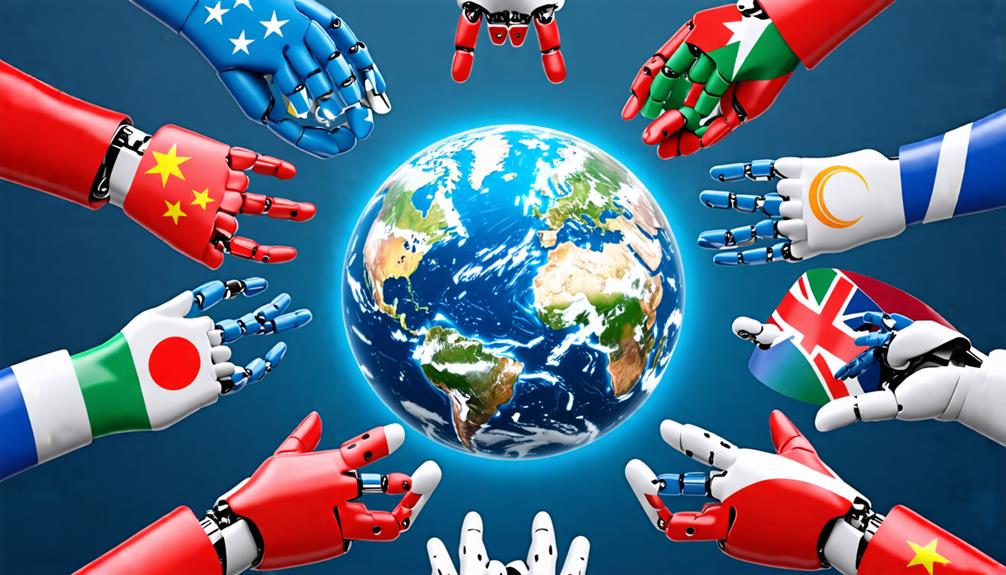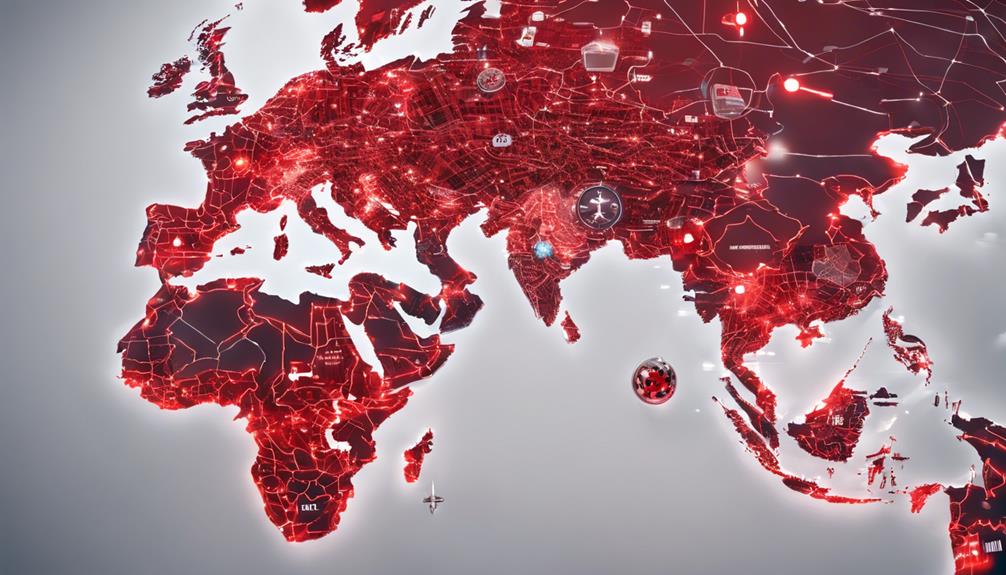
You're stepping into a world where the race for AI dominance is fierce, with the United States and China at the forefront. The U.S. leads with its innovation hubs like Silicon Valley, powerhouse companies, and significant government backing. Simultaneously, China is pushing hard with massive investments and strategic initiatives aimed at becoming the global leader by 2030. Though Europe, India, and Russia are also key players, the real tussle remains between the U.S. and China. Each country's approach to technology, policy, and integration into industries could pivot the lead. This evolving landscape suggests the battle is far from over.
The United States' AI Prowess

The United States leads the global AI race with its cutting-edge innovations and robust tech industry. You're witnessing a nation where Silicon Valley serves not only as a tech hub but also as a global trendsetter in AI development.
Major American companies like Google, IBM, and Microsoft channel vast resources into AI research and development, pushing boundaries far beyond traditional tech landscapes.
This prowess isn't just about corporate giants either. The U.S. government backs numerous initiatives that propel AI technology forward. Through funding and policy making, they ensure that the framework for AI development is both innovative and secure, fostering an environment where scientific research flourishes.
You'll also find that American universities are at the forefront of AI research. Institutions like MIT, Stanford, and Carnegie Mellon aren't just educating the next generation of AI experts; they're leading groundbreaking research projects that set global benchmarks.
In your everyday life, from smartphones to home automation systems, the fingerprints of American AI innovation are everywhere. This pervasive influence underscores the U.S.'s prime position in AI, not just in creating technologies, but in defining their global application and ethical norms.
China's Strategic AI Investments
China invests strategically in AI, aiming to rival U.S. dominance by focusing on both technological innovation and broad industry application. You're witnessing a nation leveraging massive state resources and private sector vitality to sprint ahead in the global AI race. It's a multi-faceted approach, ensuring that AI doesn't just elevate technology sectors but permeates diverse industries such as healthcare, finance, and manufacturing.
China's government channels funds into AI research hubs, attracting top talents and fostering collaborations between universities and tech giants. You're looking at a scenario where Beijing isn't just a city; it's a burgeoning epicenter for AI advancements. This strategy isn't merely about gaining a competitive edge; it's about setting global standards.
The focus goes beyond just development. You observe how China prioritizes integrating these innovations into everyday life. From smart cities to AI-driven public security systems, the practical applications are as ambitious as the technological leaps.
You must note the strategic importance of data in China's AI journey. With a vast population, you've got a data goldmine, which significantly boosts machine learning efficiencies. By harnessing this data, China isn't just playing catch-up; you're watching it position itself as a formidable global AI leader.
Europe's Regulatory Approach

While China rapidly advances in AI through significant investment, Europe emphasizes a stringent regulatory framework to govern AI development and implementation.
You're witnessing a scenario where the EU isn't just reacting to the digital age but actively shaping it. They're not only concerned about technological leadership but also about safeguarding ethical standards and protecting citizens' rights.
Europe's approach can seem cautious, perhaps even slow compared to the U.S. or China. Yet, it's strategic, aiming for sustainability and public trust. By implementing comprehensive regulations like GDPR and the proposed AI Act, Europe is setting global standards that you might find are influencing international norms.
You're looking at a framework that insists on transparency, accountability, and fairness in AI applications, making sure that AI systems don't become black boxes that no one can understand or challenge.
This might mean you'll see European AI development progressing at a different pace. But it also means that innovations are thoroughly vetted for safety and ethical considerations before they hit the market.
You're seeing a unique blend of innovation and regulation, a model that could very well ensure that AI benefits all facets of society without compromising fundamental values or personal freedoms.
AI Innovations in India
India's AI sector is rapidly expanding, with groundbreaking innovations emerging across various industries. You'll find startups and established companies alike pushing the boundaries of artificial intelligence, transforming everything from healthcare to agriculture.
In healthcare, AI tools are revolutionizing diagnostics and patient care, making it faster and more accurate. Imagine getting medical advice tailored precisely to your genetic makeup, a reality that's becoming possible thanks to these advancements.
In the agricultural sector, AI is being used to predict weather patterns, analyze soil health, and optimize crop yields. This isn't just about better food production; it's about sustainable practices that can feed more people with fewer resources. You're seeing a future where famines and food shortages can be significantly mitigated through smart technology.
Furthermore, India's commitment to education in AI technology shines through its numerous AI research centers and collaborations with global tech giants. These initiatives aren't only enhancing India's tech capabilities but also positioning the country as a leader in AI ethics and development.
You're witnessing a nation that's not just following global trends but setting them, making a significant mark on the international AI map.
Russia's Role in AI Development

Russia is also making significant strides in AI development, with a focus on enhancing military capabilities and cybersecurity. You'll find that their commitment extends beyond mere adaptation into a robust integration of AI technologies across various sectors. The state has recognized AI's pivotal role in maintaining and enhancing its strategic position globally, which is why they're pouring resources into it.
The Russian government has launched national projects aimed at AI that not only improve their defense systems but also have far-reaching effects on their economy and societal functions. You might be interested to know that Russia is developing AI technologies that can automate large-scale processes in manufacturing, optimize logistics, and enhance the efficiency of energy sectors.
Moreover, Russia's emphasis on AI in education demonstrates their intent to foster a new generation equipped with the necessary skills to advance these technologies further. They've introduced AI-focused curriculums in universities and even secondary schools, ensuring that young minds are primed for innovation in AI from an early age.
As you explore Russia's AI landscape, it's clear they're crafting a multifaceted approach that balances aggressive technological advancement with strategic national interest, making them a key player in the global AI arena.
Japan's Technological Contributions
Japan's AI initiatives are reshaping global technology landscapes, highlighting their innovative prowess in robotics and data analysis. You'll find that Japan isn't just keeping pace; it's setting the pace in numerous AI-driven fields. Their approach combines deep traditions with futuristic innovation, making them key players on the global stage.
Consider their robotics industry, a sector where Japan has long been a pioneer. You're looking at a country that not only creates robots for manufacturing but also for personal care and disaster relief. These advancements aren't just about replacing human labor; they're about enhancing capabilities and reaching new efficiencies.
When it comes to data analysis, Japan's precision and attention to detail come into play. Their companies are leveraging AI to sift through massive datasets, extracting insights that drive consumer products and safety improvements. This isn't just about business growth; it's about creating societal benefits that elevate the standard of living.
You'd also be intrigued by Japan's rapid adoption of AI in sectors like healthcare, where AI tools help diagnose diseases with accuracy that rivals and sometimes surpasses human doctors. This commitment to integrating AI seamlessly into everyday life isn't just impressive; it's transformative, setting benchmarks for others to follow.
AI Ethics and Global Impact

As AI technology advances, it's essential to address the ethical implications and global impacts these innovations bring. You're living in an era where AI systems can influence everything from your job prospects to your access to healthcare. It's crucial to ask: who's responsible when AI makes a life-altering decision?
The answer isn't just about creating accountable AI but also about ensuring that these technologies are used fairly across all societies.
You've likely heard about AI bias, where systems can perpetuate or even exacerbate existing inequalities. This happens because AI learns from vast amounts of data that reflect past human prejudices. You must demand transparency in how these algorithms are developed and insist that they're continually audited for fairness.
Moreover, the global reach of AI means that its impact isn't confined by national borders. As you consider this, think about how developing countries can participate in and benefit from AI advancements. There's a risk that wealthier nations could monopolize AI benefits, deepening global disparities.
You play a role in advocating for international collaborations that ensure AI advancements are shared and beneficial globally, not just within wealthy enclaves.
Predicting the Future Leader
Predicting which nation will dominate the AI landscape is no simple task. You've got to consider a slew of factors that play into the equation: technological prowess, government support, educational infrastructure, and even the ethical frameworks that guide AI development. It's a complex puzzle, and you're right in the middle of it, trying to piece it all together.
You might think the United States, with its Silicon Valley giants, leads the charge. They've got the innovation hubs, the funding, and the entrepreneurial spirit that fuels rapid advances in AI. But don't count out China. They're making massive strides, backed by ambitious government initiatives aimed at becoming the world leader in AI by 2030. Their approach is more top-down, which could streamline progress in ways that a more decentralized system can't.
Then there's the European Union, taking a different tack with its emphasis on ethical AI. This might slow them down initially, but could pay off in the long run by building global trust in their AI solutions.
Frequently Asked Questions
How Does AI Impact Daily Life in Underdeveloped Countries?
AI impacts your daily life in underdeveloped countries by improving healthcare through diagnostic tools, enhancing education with personalized learning, and increasing agricultural productivity with predictive analytics, making essential services more accessible and efficient for you.
What AI Applications Are Popular in Entertainment?
In entertainment, you'll find AI applications like personalized streaming recommendations, virtual reality games, and automated music composition enhancing your experiences, making them more interactive and tailored to your preferences.
How Does AI Influence Traditional Educational Methods?
AI transforms traditional education by personalizing learning experiences and automating administrative tasks. You'll find AI tutors and adaptive learning platforms that tailor content to meet your specific educational needs and pace.
What Role Does AI Play in Modern Agriculture?
AI revolutionizes modern agriculture by optimizing crop yields, managing resources efficiently, and predicting weather patterns, ensuring you're equipped to make informed decisions that enhance productivity and sustainability on your farm.
Which Startups Are Leading AI Breakthroughs Globally?
You're wondering about startups driving AI breakthroughs worldwide. Companies like OpenAI, DeepMind, and SenseTime are pushing boundaries with innovative solutions in various sectors, leading significant advancements in artificial intelligence technology globally.
Conclusion
As you look ahead, it's clear the race to lead in AI is fierce. The U.S. and China are front-runners with their massive investments and tech advancements.
Europe's tight regulations could either stifle or refine its AI endeavors, while India and Japan continue to innovate sharply. Russia's contributions, though less highlighted, still play a role.
Ultimately, who leads may come down to balancing innovation with ethics. Keep an eye on how these dynamics evolve to spot the future leader.






